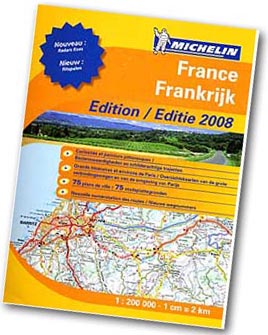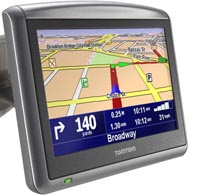 First rule for you to remember (should you come from the UK) when planning to drive in France for a carp fishing holiday is : drive on the right side of the road!
First rule for you to remember (should you come from the UK) when planning to drive in France for a carp fishing holiday is : drive on the right side of the road!
Be especially careful when setting off from service stations or restaurants on the left side of the road.
Also, bear in mind that you may have to give priority to traffic coming from the right (priorité à droite), especially in built up areas or when on small roads. Usually on large roads you do not give priority to the right, except on the peripherique, the ring road around Paris.
Many anglers I meet have not driven abroad before and apprehend the experience with some dread. In general it is not really that difficult, you just have to stay focused and make sure you concentrate and look more carefully before manoeuvring than you would at home. My Tomtom always reminds me when I drive on the left in the UK, so it is a nice touch to have this reminder when in France.As I said the most critical time is when you start off after a break. I’ve heard of a number of accidents caused by this lapse of concentration, especially on quiet country roads. Perhaps you could tape a reminder to the steering wheel… ‘Drive on the Right!’
Before leaving the UK I’d suggest a thorough service of your vehicle to make sure it is in tip top condition before you set off.
There are a number of things you need to bring with you when you venture onto the continent.
5 Things you must bring with you.
- Log book: Most European countries require you to carry your V5C vehicle registration document. You will be requested to produce it by the Gendarme should you get pulled over. Also in the case of an accident the information pertaining to your car will be needed for the report and requested by the police. You are required by law in France to have this document with you when you drive at all times.
- Driving licence: You need to have a full drivers licence, a provisional is not sufficient to drive abroad. Again it will be requested by police if you get stopped, and will be needed for an accident report. This is another document that you are required to carry when driving in France.
- Insurance Green card: It is important that you carry your insurance with you at all times too, as this is the third document you are required to produce in case of an accident. The Green card is no longer obligatory but a good idea nonetheless.
- GB Sticker: You are required to have one of these, but most number plates have a little GB on them now, which is accepted anywhere in the EU instead of a separate sticker.
- Headlight deflectors: These are important on right hand drive cars to avoid dazzling on coming traffic.
5 Things you need to bring with you.
- Spare bulbs: Not a legal requirement, but if you get stopped for a blown bulb and can’t change it you’ll probably get a spot fine. So for the price of a set of spares it’s certainly worth having them in your glove box.
- Warning triangle: You’ll need to use either a warning triangle or hazard warning lights in case of an accident. Or both if you have them. The triangle is only mandatory for vehicles over 3.5 tonnes. Legal requirement since 1st October 2008
- Fluoro vest: Not a legal requirement but a sensible item to carry. If you break down on a busy road or motorway it could certainly help with your personal safety. Legal requirement since 1st October 2008
- Good map of France: I’d suggest a Michelin Atlas. Excellent detail and has most of the minor roads too. Get a recent edition as there have been a number of modifications to the road network over the last few years including several new motorways.
- Spare Fuses: Again a sensible thing to carry is a set of fuses. A blown fuse can have varying consequences on your car from very little to total immobility. So for a few pence it’s a must to have in your glove box.
7 Things that are a good idea to bring with you
- Breakdown recovery insurance: I’ve seen it a number of times where anglers break down and are stranded and facing a huge bill to get towed and repatriated. You can’t just rely on ‘It won’t happen to me’. Even a minor bump can see you car immobilised and with all you gear it can turn a trip into a nightmare. So get yourself AA, RAC, or Green Flag insurance and you’ll have far less to worry about. For the few quid it costs it’s false economy to skimp on this.
- Jumpstart cables : I guess we’ve all flattened our battery at some point, leaving lights on etc. A set of jump cables is a must as far as I’m concerned and I always have them in my van.
- Booster pack: Can replace the above, as long as you keep it fully charged. A useful piece of kit to have with you. Can also be used to charge up your phones etc on the bank.
- Tow rope: Getting stuck around lakes is a risk we all take. I no longer drive a 4×4 which saved me and others on a number of instances. Vans and light cars especially rear wheel drives are hopeless on greasy or wet grass or mud. If you have a good rope at least you can try to get assistance to pull you out.

- GPS: I wouldn’t be without my Tomtom Sat Nav now. I find it absolutely brilliant for navigating my way round France. I use it in conjunction with Google Earth to plan my route, entering the longitude/latitude coordinates of each stop. Brilliant invention..highly recommended.
- Mobile phone -Europe roaming: Useful if you want to ring home… I got caught out once in the UK when I changed phones and forgot to stipulate I wanted Europe roaming.
- European Accident Insurance Form: Helpful to make sure you obtain and give all the necessary details for an insurance claim in case of an accident.
Bon Voyage
Gareth

Comments